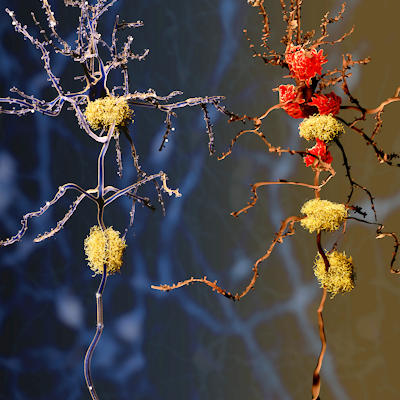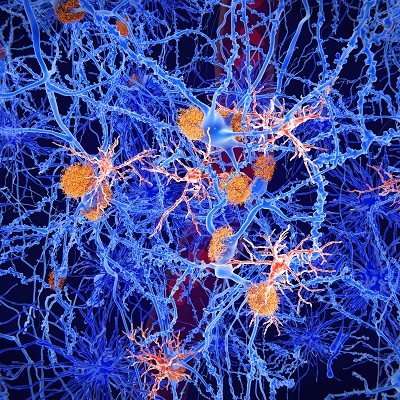May 15, 2023 -- For many years, researchers followed a patient who, despite being genetically predisposed to develop early-onset Alzheimer's disease, beat the odds. Their research, published Monday in Nature Medicine, led to the discovery of a new genetic variant that provides protection from Alzheimer's disease, a pathway for resilience to dementia, and the identification of a brain region to target with therapeutics.
Carriers of a genetic variant called the Paisa mutation (Presenilin-1 E280A) usually develop mild cognitive impairment around age 44 and dementia at age 49, then die from dementia complications in their 60s. But the male Paisa mutation carrier studied remained cognitively intact until age 67, progressed to mild dementia at age 72, and died at 74. The patient was enrolled in the Mass General Colombia-Boston biomarker study, which brings members of an extended Colombian family of 6,000 individuals with the Paisa mutation to Boston for advanced neuroimaging and genetic examinations.
Many treatments for Alzheimer's disease target reducing amyloid plaque buildup. This patient, and another protected relative, had high amyloid levels in their brains. Neuroimaging scans taken at age 73 revealed that the patient's amyloid-beta plaque burden was high and in some regions of his brain he had tau, a protein known to form pathological tangles in brains with Alzheimer's disease. However, his entorhinal cortex, which plays a critical role in memory and learning, had very limited tau pathology, leading researchers to believe that the entorhinal region may represent a tiny target critical for dementia protection.
The team performed genetic and molecular analyses to identify variants that may have protected this patient. The most promising candidate was a new and rare variant in the Reelin gene, named Reelin-COLBOS.
Reelin is a protein with a pivotal role in regulating brain cell development and function. Previous studies have linked Reelin mutations to diseases like autism, schizophrenia, epilepsy, and bipolar disorder. However, while mutations linked to disease diminish the protein's function, in the case of Reelin-COLBOS, the protective variant increases the protein's function. Reelin diminishes the phosphorylation of tau, which causes the formation of neurofibrillary tangles. Additional studies showed that the Reelin-COLBOS variant also protected against tau pathology in mice.
The researchers plan to continue working to identify additional protected patients from these families, and research the regions of the brain to focus on for the delivery of treatments that target this pathway. They acknowledge the privilege of having these genetic cases to work on.
"Extraordinary cases like this one illustrate how individuals and extended families with Alzheimer's disease can help advance our understanding of the disease and open new avenues for discovery," Yakeel T. Quiroz, a co-senior author and clinical neuropsychologist and neuroimaging researcher at Massachusetts General Hospital, said in a statement. "The insights from this case may guide us on where in the brain we need to look to delay and stop disease progression and will help us form new hypotheses about the series of steps that may lead to Alzheimer's dementia."
Disclosures: Co-authors Arboleda-Velasquez and Dr. Leo A. Kim are co-founders of Epoch Biotech, a biotech firm developing case-inspired therapeutics. Co-authors Yakeel Quiroz and Francisco Lopera are consultants for Biogen, a multinational biotech.
Copyright © 2023 scienceboard.net












